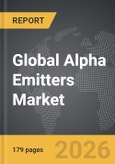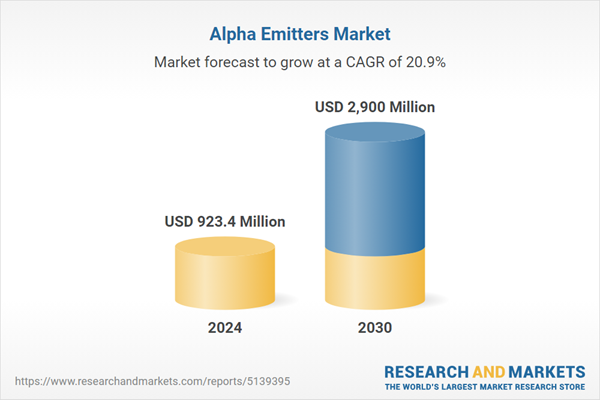Global Alpha Emitters Market - Key Trends and Drivers Summarized
What Makes Alpha Emitters Pivotal in Cancer Treatment?
Alpha emitters have emerged as a critical component in the treatment of cancer, offering a unique and potent approach to targeting and destroying malignant cells. These radioactive isotopes, such as radium-223 and actinium-225, emit alpha particles that deliver highly localized and intense radiation. This characteristic enables them to effectively kill cancer cells while minimizing damage to surrounding healthy tissue. The precision and potency of alpha emitters make them particularly valuable in treating metastatic cancers and other hard-to-reach tumors. Unlike traditional radiation therapy, which can have widespread side effects, alpha emitters offer a more targeted treatment option, enhancing patient outcomes and quality of life.How Are Technological Advancements Enhancing Alpha Emitter Therapies?
Technological advancements have significantly enhanced the development and application of alpha emitter therapies. Innovations in radiopharmaceutical production and delivery systems have improved the stability and targeting accuracy of alpha emitters. Advances in molecular imaging and diagnostics have also played a crucial role, allowing for precise localization of tumors and better monitoring of treatment response. Moreover, the integration of alpha emitters with advanced drug delivery systems, such as nanoparticles and monoclonal antibodies, has further refined their targeting capabilities. These technological strides have not only increased the efficacy of alpha emitter therapies but also expanded their potential applications in treating a variety of cancers, including those that are resistant to conventional treatments.What Trends Are Shaping the Alpha Emitters Market?
Several key trends are shaping the alpha emitters market, reflecting broader shifts in oncology and personalized medicine. The growing emphasis on precision medicine has driven the adoption of alpha emitter therapies, as they align with the trend towards more individualized treatment approaches. Additionally, there is increasing investment in research and development to explore new alpha-emitting isotopes and novel therapeutic combinations. Regulatory support and the approval of alpha emitter therapies by health authorities have also boosted market growth, making these treatments more accessible to patients. Furthermore, the rising prevalence of cancer worldwide and the need for more effective treatment options have spurred demand for alpha emitters, highlighting their critical role in the future of cancer therapy.What Factors Are Driving the Growth of the Alpha Emitters Market?
The growth in the alpha emitters market is driven by several factors, primarily technological advancements, expanding applications, and evolving healthcare landscapes. Technological innovations in radiopharmaceuticals and precision medicine have significantly enhanced the development and deployment of alpha emitters, making them more effective and accessible. The expanding applications of alpha emitters in treating various types of cancer, including those resistant to traditional therapies, have opened new market opportunities. Additionally, the increasing prevalence of cancer and the growing demand for targeted and personalized treatments have fueled market growth. Strategic partnerships and collaborations between pharmaceutical companies and research institutions are accelerating the development of new alpha emitter therapies, further propelling market expansion. Moreover, regulatory support and the approval of alpha emitter therapies by health authorities have facilitated broader adoption, ensuring that these advanced treatments reach more patients. The combination of these factors ensures a robust growth trajectory for the alpha emitters market in the coming years.Report Scope
The report analyzes the Alpha Emitters market, presented in terms of market value (USD). The analysis covers the key segments and geographic regions outlined below.- Segments: Application (Bone Metastasis, Ovarian Cancer, Pancreatic Cancer, Melanoma, Other Applications).
- Geographic Regions/Countries: World; United States; Canada; Japan; China; Europe (France; Germany; Italy; United Kingdom; and Rest of Europe); Asia-Pacific; Rest of World.
Key Insights:
- Market Growth: Understand the significant growth trajectory of the Bone Metastasis Application segment, which is expected to reach US$993.8 Million by 2030 with a CAGR of 20.4%. The Ovarian Cancer Application segment is also set to grow at 22.1% CAGR over the analysis period.
- Regional Analysis: Gain insights into the U.S. market, valued at $251 Million in 2024, and China, forecasted to grow at an impressive 19.4% CAGR to reach $426.9 Million by 2030. Discover growth trends in other key regions, including Japan, Canada, Germany, and the Asia-Pacific.
Why You Should Buy This Report:
- Detailed Market Analysis: Access a thorough analysis of the Global Alpha Emitters Market, covering all major geographic regions and market segments.
- Competitive Insights: Get an overview of the competitive landscape, including the market presence of major players across different geographies.
- Future Trends and Drivers: Understand the key trends and drivers shaping the future of the Global Alpha Emitters Market.
- Actionable Insights: Benefit from actionable insights that can help you identify new revenue opportunities and make strategic business decisions.
Key Questions Answered:
- How is the Global Alpha Emitters Market expected to evolve by 2030?
- What are the main drivers and restraints affecting the market?
- Which market segments will grow the most over the forecast period?
- How will market shares for different regions and segments change by 2030?
- Who are the leading players in the market, and what are their prospects?
Report Features:
- Comprehensive Market Data: Independent analysis of annual sales and market forecasts in US$ Million from 2024 to 2030.
- In-Depth Regional Analysis: Detailed insights into key markets, including the U.S., China, Japan, Canada, Europe, Asia-Pacific, Latin America, Middle East, and Africa.
- Company Profiles: Coverage of players such as Actinium Pharmaceuticals, Inc., Alpha Tau Medical, Bayer AG, Fusion Pharma, IBA Group and more.
- Complimentary Updates: Receive free report updates for one year to keep you informed of the latest market developments.
Some of the 12 companies featured in this Alpha Emitters market report include:
- Actinium Pharmaceuticals, Inc.
- Alpha Tau Medical
- Bayer AG
- Fusion Pharma
- IBA Group
- IBA Radiopharma Solutions
- Lantheus Medical Imaging, Inc.
- NTP Radiosotopes SOC Ltd.
- RadioMedix, Inc.
- Siemens Healthineers
- Telix Pharmaceuticals Ltd.
- Triad Isotopes, Inc.
This edition integrates the latest global trade and economic shifts into comprehensive market analysis. Key updates include:
- Tariff and Trade Impact: Insights into global tariff negotiations across 180+ countries, with analysis of supply chain turbulence, sourcing disruptions, and geographic realignment. Special focus on 2025 as a pivotal year for trade tensions, including updated perspectives on the Trump-era tariffs.
- Adjusted Forecasts and Analytics: Revised global and regional market forecasts through 2030, incorporating tariff effects, economic uncertainty, and structural changes in globalization. Includes historical analysis from 2015 to 2023.
- Strategic Market Dynamics: Evaluation of revised market prospects, regional outlooks, and key economic indicators such as population and urbanization trends.
- Innovation & Technology Trends: Latest developments in product and process innovation, emerging technologies, and key industry drivers shaping the competitive landscape.
- Competitive Intelligence: Updated global market share estimates for 2025, competitive positioning of major players (Strong/Active/Niche/Trivial), and refined focus on leading global brands and core players.
- Expert Insight & Commentary: Strategic analysis from economists, trade experts, and domain specialists to contextualize market shifts and identify emerging opportunities.
Table of Contents
Companies Mentioned (Partial List)
A selection of companies mentioned in this report includes, but is not limited to:
- Actinium Pharmaceuticals, Inc.
- Alpha Tau Medical
- Bayer AG
- Fusion Pharma
- IBA Group
- IBA Radiopharma Solutions
- Lantheus Medical Imaging, Inc.
- NTP Radiosotopes SOC Ltd.
- RadioMedix, Inc.
- Siemens Healthineers
- Telix Pharmaceuticals Ltd.
- Triad Isotopes, Inc.
Table Information
| Report Attribute | Details |
|---|---|
| No. of Pages | 179 |
| Published | February 2026 |
| Forecast Period | 2024 - 2030 |
| Estimated Market Value ( USD | $ 923.4 Million |
| Forecasted Market Value ( USD | $ 2900 Million |
| Compound Annual Growth Rate | 20.9% |
| Regions Covered | Global |









